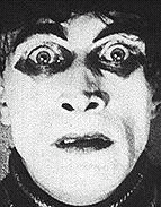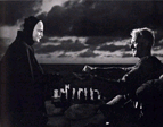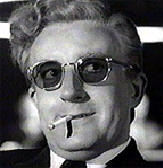

| Dr. Patrick Duffey Professor of Spanish Dean of Humanities |
Campus Box 61555 |
| Sherman Hall 103 | pduffey@austincollege.edu |
| Office Hours: M-F 11am-1pm; 4pm-5:30pm (an appointment might be necessary) | http://artemis.austincollege.edu/acad/cml/pduffey/PD.html |
| (903) 813-2361 |
Baudelaire, Charles. Baudelaire on Poe;
Critical Papers. State College, PA: Bald Eagle Press, 1952.
Borges, Jorge
Luis (1899-1986). Collected Fictions. Trans. Andrew Hurley. New
York: Penguin, 1999.
Chesterton, G.K. (1874-1936) "The Invisible Man," in The
Innocence of Father Brown, 1911.
Cortázar,
Julio (1914-1984). Blow-Up, and
Other Stories. New York: Pantheon Books,
1985.
Couturier, Maurice. “Annotating vs. Interpreting Nabokov: The
Author as a Helper or a Screen?” Cycnos, Volume 24 n°1, placed
on-line March 20, 2008. ,
http://revel.unice.fr/cycnos/document.html?id=1034
Greenblatt, Stephen. "Racial Memory and Literary History,"
PMLA,
Vol. 116, No. 1, Special Topic: Globalizing Literary Studies, (Jan., 2001), pp.
48-
63.
Gunning, Tom.
‘From the Kaleidoscope to the X-Ray: Urban Spectatorship, Poe,
Benjamin, and Traffic in Souls (1913)’, Wide Angle, 19:4, (1997),
25-61.
Haddawy,
Husain, and Muhsin Mahdi. The Arabian
Nights = Alf Laylah Wa-Laylah. New York:
Norton, 1990.
________. The Arabian Nights II:
Sinbad and Other Popular Stories. New
York, N.Y.: Norton, 1995.
Hawthorne, Nathaniel (1804-1864).
"Wakefield," 1835.
Kafka,
Franz
(1883-1924). "The Great Wall of China." "The
News of the Building of the Wall: A Fragment." "A Hunger Artist." "The
Burrow."
London, Jack (1876-1916). "The Minions of Midas"
Kristal, Efraín.
Invisible work : Borges and translation.
Nashville: Vanderbilt UP, 2002.
Lugones, Leopoldo (1874-1938),
and Gilbert Alter-Gilbert. Strange
Forces. Pittsburgh, PA: Latin America
Literary Review Press, 2001.
Melville,
Herman (1819-1891). "Bartleby, the Scrivener: A Story of Wall Street,"
1853.
Nabokov, Vladimir (1899-1977). Lectures on Russian
Literature. New York: Harcourt Brace Jovanovich, 1982.
Poe, Edgar Allan (1809-1849),
"The Purloined Letter," "The
Man of the Crowd," "The Pit and the Pendulum," "The Black Cat" in The Portable Edgar Allan Poe,
ed. J. Gerald Kennedy. Penguin classics. New York:
Penguin Books, 2006.
Tolstoy, Leo (1828-1910). The
Death of Ivan Ilych, 1886.
Villiers de l'Isle Adam, Auguste (1838-1889). "The Torture of Hope"
Films
 1. Das Kabinett des Doktor Caligari [The cabinet of Dr. Caligari] (1920) Directed by Robert Wiene |
 2. Det Sjunde inseglet {The seventh seal] (1957) Directed by Ingmar Bergman |
|
![]()
I. Description.
Argentine writer Jorge Luis Borges was one of the greatest readers of all time. Expert in many languages and literatures (Spanish, English, French, German, Latin, Anglo Saxon, and Old Norse, among others), he spent his life exploring the essays, treatises, stories, theories, and poems of dozens of ages and cultures. “Let others boast of the books they have written; I will boast of those books it has been my privilege to read.” Before his death in 1986, Borges made a list of over seventy of his favorite texts and wrote prologues for new editions of them, explaining the particular delight he had taken in each. He did not choose them because they were texts made famous by critics or by bestseller lists. In fact, his favorites were often eccentric texts by peculiar writers. They were the books that had given him the most profound pleasure, insight, angst, or joy.
In this course, you will indulge fully in your own pleasures, insights, angsts, and joys of reading. You will examine them, question their existence, and write clearly and analytically about them in formal papers.
Along the way, you will explore how writers other than Borges "read" these writers and their texts: Baudelaire's reading of Poe, Melville's of Hawthorne, Nabakov's of Tolstoy, and Foucault's of Borges himself.
The primary objective of this course is to help
students develop a wide variety of skills necessary for academic
success, in the context of exploring one particular topic in depth.
Specific skills addressed will be:
![]() critical reading and critical thinking;
critical reading and critical thinking;
![]() effective written and oral communication;
effective written and oral communication;
![]() study skills and time management;
study skills and time management;
![]() examination skills; and,
examination skills; and,
![]() collaborative learning.
collaborative learning.
This course also has a social dimension: to promote learning and interaction within the student's peer group.
III. Student Leaders and the Six Groups.
GROUP
ASSIGNMENTS
|
I |
II |
III |
IV |
V |
VI |
| Gloria Carey |
Jessica Douglas |
Reena Patro |
Ben Walker |
Miles Vaughn |
Sarah White |
| Alexander, Hannah N |
Hayworth, Carly E |
Johnstone, Matthew J |
Norris, Kendra L |
Ruiz, Priscilla M |
Temmer, Sarah L |
| Baca, Kyle A |
Hughes, Chase A |
Kieschnick, Sara P |
O'Hanlon, Chelsea R |
Sanchez, Adani |
Tucker, Jarrett L |
| Haase, Megan M |
Johnson, Jessica B |
Murphy, Savannah E |
Rabuse, Kalyn M |
Snyder, Kelly E |
Vazquez, Zachary J |
|
Student Leaders |
|
Oral Presentation Group Topic |
|
Gloria Carey |
Group 1 |
Arabian Nights |
|
Jessica Douglas |
Group 2 |
Arabian Nights |
|
Reena Patro and Ben Walker |
Group 3 |
Poe |
|
Miles Vaughn |
Group 5 |
Hawthorne, Melville, and/or Kafka |
| Sarah White | Group 6 | Hawthorne, Melville, and/or Kafka |
I have assigned 3-4 students to each of the student leaders. All six student leaders are wonderful people, so I am sure that they will be very helpful to you. You should feel free to ask them questions about any aspect of this course or of AC life. In general, their responsibilities will include the following:
![]() They will read the first drafts of the
two short essays and of the research paper. They will make
corrections and suggestions (which the
student is NOT obliged to follow) and will
return the students' work the following Monday.
They will read the first drafts of the
two short essays and of the research paper. They will make
corrections and suggestions (which the
student is NOT obliged to follow) and will
return the students' work the following Monday.
![]() The student leaders will also organize
certain social activities during the semester.
The student leaders will also organize
certain social activities during the semester.
Students should attend all class meetings (including video presentations), unless there is a valid excuse which is conveyed to the instructor in a timely manner. After three unexcused absences the student's grade will be lowered by 10 percent for each class missed. With six or more unexcused absences the student may be dropped from the course. In-class work (quizzes, reports, writing assignments) missed due to an absence cannot be made up except in extreme circumstances, unless arrangements are made in advance of the day the class meets.
All students are required to abide by the College's Policy on Academic Integrity. Aspects of this policy, especially plagiarism, will be covered in class.
|
A. Two short essays (750 words; 2-3 pages) |
20% |
|
B. Research paper (2,000 words, excluding bibliography; 7-8 pages) |
20% |
|
C. 10 Reading Quizzes (and other misc. quizzes) |
30% |
| D. Group PowerPoint® Presentation | 20% |
|
E. Contributions to class discussions |
10% |
A. Two short analytical essays (750 words; 2-3 pages each). 20%.
The purpose of the short assignments is to help the student learn and refine the most important academic skill of all: the ability to write clearly, succinctly, and persuasively and/or entertainingly. I will assign each topic based on the readings. The student will turn in the first draft to their student leader, who will return it with corrections and suggestions (which the student is NOT obliged to follow) to the student the following Monday. The final version of the essay is due to me the following Friday. Both versions should be typed and double-spaced.
B. Research Paper (2,000 words, excluding bibliography; 7-8 pages). 20%.
Another academic skill is the ability to carry out research. This class will acquaint you with the numerous resources of the library and the World Wide Web. Hopefully, the class will enable you to see research not as a tedious assignment but as a marvelous treasure hunt.
The research paper may pertain to any one or more of the literary works assigned for this course. You will complete your paper in three stages. By November 17, you will turn in an annotated bibliography of at least five secondary sources (2 books, 2 articles, and 1 internet source). By November 24th, you will turn in a two-page outline of the paper. The first draft of the paper is due to the respective student leader on December 1st. The final version is due to me on December 9th. The grading percentages break down as follows: bibliography=2%; outline=3%; final version=15%.
C. 10 Reading Quizzes (and other misc. quizzes). 30%.
The weekly reading quizzes will not be difficult or nit-picky. If you do the assigned readings, you should do fine on the tests. I do not use "pop" quizzes, so as long as you listen and come to class, you will know what to study for these tests.
There will also be a few announced quizzes over excerpts from Strunk & White's The Elements of Style, MLA bibliographic style, etc., as needed.
E. Group Presentations: Pastiche Skits. 20%.
Two other important academic skills are group work and oral presentation. You will learn about both as you prepare this project with the members of your group, guided by your student leader.
On each of three days during the semester, two groups will present a pastiche skit, that is, a parodic or non-parodic version of the literary style of the texts we are studying at the time. The objective is for students to present texts as seen through the ideas of Borges, through Borges's lens. Groups One and Two will invent a new, original Arabian Nights tale with noticeable Borgesian aspects. Groups Three and Four will create a tale in the style of Edgar Allan Poe with certain details that Borges would have enjoyed. Finally, Groups Five and Six will put together stories in the style of Melville, Hawthorne, and/or Kafka, with distinctive elements of Borges.
All presentations should include the following:
1. At least two to three well-chosen props.
2. A good number of relevant powerpoint images for use as background images.
3. Two to three minutes of speaking time for each group member.
VII. Outline
Abbreviations
JLBCF=Borges, Jorge
Luis. Collected Fictions.
ER=Electronic reserve
Week 1
W 3 sep Borges, "John Wilkins' Analytical Language" (handout). Arabian Nights (xi to xxxvi). Borges and I (BBC).
Assignment:
1. Borges, "The Thousand and One Nights" (ER) 42-57
2. Arabian Nights 1-80
F 5 sep Arabian Nights
Assignment:
1. Borges, "The Secret Miracle" JLBCF 157-162
2. Borges, "The Translators of The Thousand and One Nights"
(ER) 92-109
3. Arabian Nights 248-327
Week 2
M 8 sep "The Secret Miracle" and Arabian Nights
Assignment:
1. Borges, "Ibn-Hakam al-Bokhari, Murdured in His Labyrinth" 255-262
2. Borges, "The Two Kings and the Two Labyrinths" 263-264;
also read "Postscript," 288
3. Arabian Nights 328-339
W 10 sep Arabian Nights
Assignment:
1. Borges, "The South" 174-179
2. Borges, "Averroës' Search" 235-241
3. Arabian Nights 340-355
F 12 sep Arabian Nights
Assignment:
Arabian Nights II
(ix-80)
Week 3
M sep 15 Arabian Nights: "The Story of Sindbad the Sailor" and "The Story of 'Ali Baba and the Forty Thieves"
Assignment:
Arabian Nights II (81-164)
W sep 17 "The
Story of Ala al-Din (Aladdin) and the Magic Lamp"
F sep 19 GROUPS ONE and TWO'S PASTICHES: Arabian Nights
Assignment:
1. Poe, "The Purloined
Letter" 327-344
2. Borges, "Death and the Compass" 147-156
Week 4
M sep 22 Poe and Borges
Assignment:
1. Chesterton, "The Invisible Man" 1-13 (handout)
2. Hawthorne, "Mr. Higginbotham's Catastrophe" (1-8) (ER)
3. London, "The Minions of Midas" (1-9)
W sep 24 Hawthorne, Poe, London, Chesterton, and Borges
Assignment:
1. Poe, "The Black Cat"
192-201
2. Baudelaire, Edgar Allan Poe, His Life and Works (1852)
(ER) 65-74
3, Baudelaire, "The Flask" from Fleurs du mal (1857)
DUE FRIDAY: First draft of Essay #1 to student
leader.
F sep 26 Poe and Baudelaire
Assignment:
1. Poe,
"The Pit and the Pendulum"
2. Villiers de l'Isle Adam, "The Torture of Hope" 1-4
3. Borges, "The Writing of the God" 250-254
Week 5
M sep 29 Poe, Villiers de l'Isle Adam, Borges GROUPS THREE AND FOUR'S PASTICHES: Poe
 Film
tonight! AD 204,
7pm-8pm.
Das Kabinett des Doktor
Caligari [The cabinet of Dr. Caligari] (1920)
Film
tonight! AD 204,
7pm-8pm.
Das Kabinett des Doktor
Caligari [The cabinet of Dr. Caligari] (1920)
W oct 1 Visit Abell Library (presentation by Dr. Carolyn Vickrey) (meet in Instructional Classroom, 2nd floor, Abell)
Assignment for Monday:
1. Melville,
Herman, "Bartleby, the Scrivener: A Story of Wall Street,"
39-74 (ER)
2. Borges, "Herman Melville,
Bartleby the Scrivener" JLBSNF 245-246 (ER)
3. Poe, "The
Man of the Crowd" 229-237
4. Tom Gunning,
‘From the Kaleidoscope to
the X-Ray: Urban Spectatorship, Poe, Benjamin, and Traffic in Souls
(1913)’, Wide Angle, 19:4, (1997), 25-61.
5. Hawthorne, "Wakefield" 121-132;
"Ethan Brand" 313-332
6. Finish worksheet for library session
F oct 3 Visit Career Services (Adams
Center)
DUE MONDAY: Final draft of Essay #1 to me.
Week 6
M oct 6
Melville, Hawthorne, Borges
W oct 8 Melville,
Hawthorne, Borges
Assignment:
1. Kafka,
"The Great Wall of China." "The News of the Building of the Wall: A
Fragment." "A Hunger Artist."
(ER)
2. Borges, "Kafka and His Precursors"
(ER)
363-365 JLBSNF
3. Borges, "The Total Library"
(ER)
214-216
3. Borges, "The Library of Babel" 112-118
F oct 10 FALL BREAK
Week 7
M oct 13 Kafka, Borges, the "death" of the author debate, intertextuality
Assignment:
1. Borges, "Pierre Menard, Author of the Quixote" 88-95
2. Couturier, Maurice. “Annotating vs. Interpreting Nabokov: The
Author as a Helper or a Screen?” Cycnos, Volume 24 n°1, placed
on-line March 20, 2008. ,
http://revel.unice.fr/cycnos/document.html?id=1034
W oct 15 Kafka, Borges, the "death" of the author debate, intertextuality
Assignment:
1. Borges,
"A Survey of the Works of Herbert Quain" 107-111
2. Borges, "The Circular Ruins" 96-100
F oct 17
GROUPS FIVE and SIX'S PASTICHES: Hawthorne, Melville, and/or Kafka
Assignment:
1. Borges, "Borges and I," 324 "Funes, the Memorious,"
131-137 "The South," 174-179 "The Argentine Writer and Tradition" (ER)
JLBSNF 420-427
2. Greenblatt, Stephen. "Racial
Memory and Literary History," PMLA,
Vol. 116, No. 1, Special Topic: Globalizing Literary Studies, (Jan., 2001), 48-
63. (JSTOR)
Week 8
M oct 20 Borges,
identity and nationalism
REQUIRED SPECIAL PRESENTATION: "Shakespeare
and Cervantes: The Strange Case of Cardenio,"
Dr.
Stephen Greenblatt, 7pm
Assignment:
1. Borges, "The Lottery in Babylon" 101-106
W oct 22
Assignment:
1. Borges, "Tlön, Uqbar, Orbis Tertius" 68-81
DUE FRIDAY: First draft of Essay #2 to student leader.
F oct 24 Borges
Assignment:
1. Tolstoy 1-42
Week 9
M oct 27 Tolstoy
 Film
tonight! AD 204,
7pm-8:45pm.
Det Sjunde inseglet
{The seventh seal] (1957) Directed by Ingmar Bergman
Film
tonight! AD 204,
7pm-8:45pm.
Det Sjunde inseglet
{The seventh seal] (1957) Directed by Ingmar Bergman
Assignment:
1.
Nabokov, Lectures on Russian
Literature
(ER) 236-243
W oct 29 Nabokov and Tolstoy
Assignment:
DUE FRIDAY: Final draft of Essay #2 to me.
F oct 31
Assignment:
1. Hawthorne, "Rappacinni's Daughter"
2. Lugones, "The Omega Force"
Week 10
M nov 3 Hawthorne and Lugones
Assignment:
1. Lugones, "An Inexplicable Phenomenon"
2. Lugones, "Yzur"
W nov 5 Lugones
Assignment:
1. "The Horses of Abdera"
2. "Origins of the Flood"
F nov 7 Lugones
Assignment:
1.
Week 11
M nov 10 Lugones
Assignment:
1.
Cortázar, "Axolotl"
2. Cortázar, "House Taken Over"
W nov 12 Cortázar
Assignment:
1.
Cortázar, "Continuity of Parks"
2. Cortázar, "The Night Face Up"
F nov 14 Cortázar
Assignment:
1.
Cortázar, "Bestiary"
Week 12
M nov 17 Cortázar
Assignment:
1.
Cortázar, "Blow-Up"
W nov 19 Cortázar
Assignment:
1.
Cortázar, "End of the Game"
2. Cortázar, "Secret Weapons"
F nov 21 Cortázar
Assignment:
TBA
Week 13
M nov 24 Cortázar
LAS VACACIONES
Week 14
M dec 1
 Film
tonight! AD 204,
7pm-8:45pm.
Film
tonight! AD 204,
7pm-8:45pm.
W dec 3 TBA
F dec 5 TBA
DUE Dec. 9th, 5pm, Sherman Hall 103: Final version of research paper due.